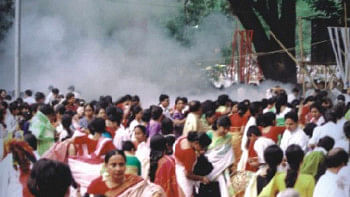Participants of Sehri Tales 2021 share their experiences

Author and journalist Sabrina Fatma Ahmad initiated Sehri Tales, a creative writing challenge, as a means to battle melancholia five years ago. Today, this challenge has become an anticipated event among many writers. The rules are quite simple: throughout the month of Ramadan, a prompt is given every night, participants must post their work online, following the 250 word limit and the deadline. 2021 was the third year that Sehri Tales was open to the public. This year's participants shared their experiences with Star Youth, The Daily Star.
With an average of 70 entries every night and over a thousand people signing up, this year had the most participants so far. As the world is facing the second year of the pandemic, many have chosen writing as an outlet during these difficult times. As such, there was a significant increase in the number of entries for Sehri Tales this year. Unlike previous years, this time Sehri Tales formed their own online community, Talespeople.
Samai Haider, an economist and freelance author, started writing when she was eight. She participated in Sehri Tales for the first time this year. "This was my first-time writing flash fiction. A few days into Sehri Tales, I noticed my stories relied heavily on word association. Whatever the prompt of the day was, I'd craft my tale around the first thing that came to mind upon seeing the prompt. It could be a song, a memory or a saying," she said. Author of a childrens' picture book, titled Tilmund's Travel Tales, she mostly focuses on travel pieces.
Tareq Adnan's entries explored the cost of daily labour. A government employee from Boston, he expressed the stress of work life in his writing. This was his second time participating in Sehri Tales. "It was a fun exercise. It sometimes forced me to explore many different styles and forms in a month," said the former writer of Rising Stars. He advised new writers to read short stories from authors like Tobias Wolff, George Saunders and Earnest Hemingway among others, when writing flash fiction.
Sehri Tales also welcomed artworks. Tahsin Mostafa Chowdhury, an Architecture student at SUST, was in awe of the writers in this challenge, and was happy when she got to submit her illustrations. "Completing an artwork within a few hours was hard at times," she said. The team behind Talespeople also weighed in. "Whether it was working behind the scenes or reading the tales after sehri, there was a sense of community, which is what we needed to get through these difficult times," said Usraat Fahmidah, moderator of Talespeople.
This year was the first time that Sehri Tales had sponsors. "I wanted to build a platform where people can begin healing through art and writing, distracted from these scary, stressful times by stories," said Ahmad. "Anyone can rant and ramble, and we're a nation of storytellers. So, give us an inch, we'll give you a saga, but the challenge is in forcing yourself to work with a format."
Ahmad was really impressed with the quality of the tales this year. "We also saw the birth of a community— people who didn't write the tales, actively participated in cheering the others on, tagging each other. It was a heartwarming experience," she said.
The Sehri Tales team is currently working through sorting out all the entries, planning a few more activations for the coming months and hoping to make the platform global in the future. In this regard, Ahmad is thankful to singer and journalist Elita Karim for her support.
She further said that Sehri Tales helped her to get through a difficult time. Over the years, she met many people who said that it did the same for them as well.

 For all latest news, follow The Daily Star's Google News channel.
For all latest news, follow The Daily Star's Google News channel. 



Comments